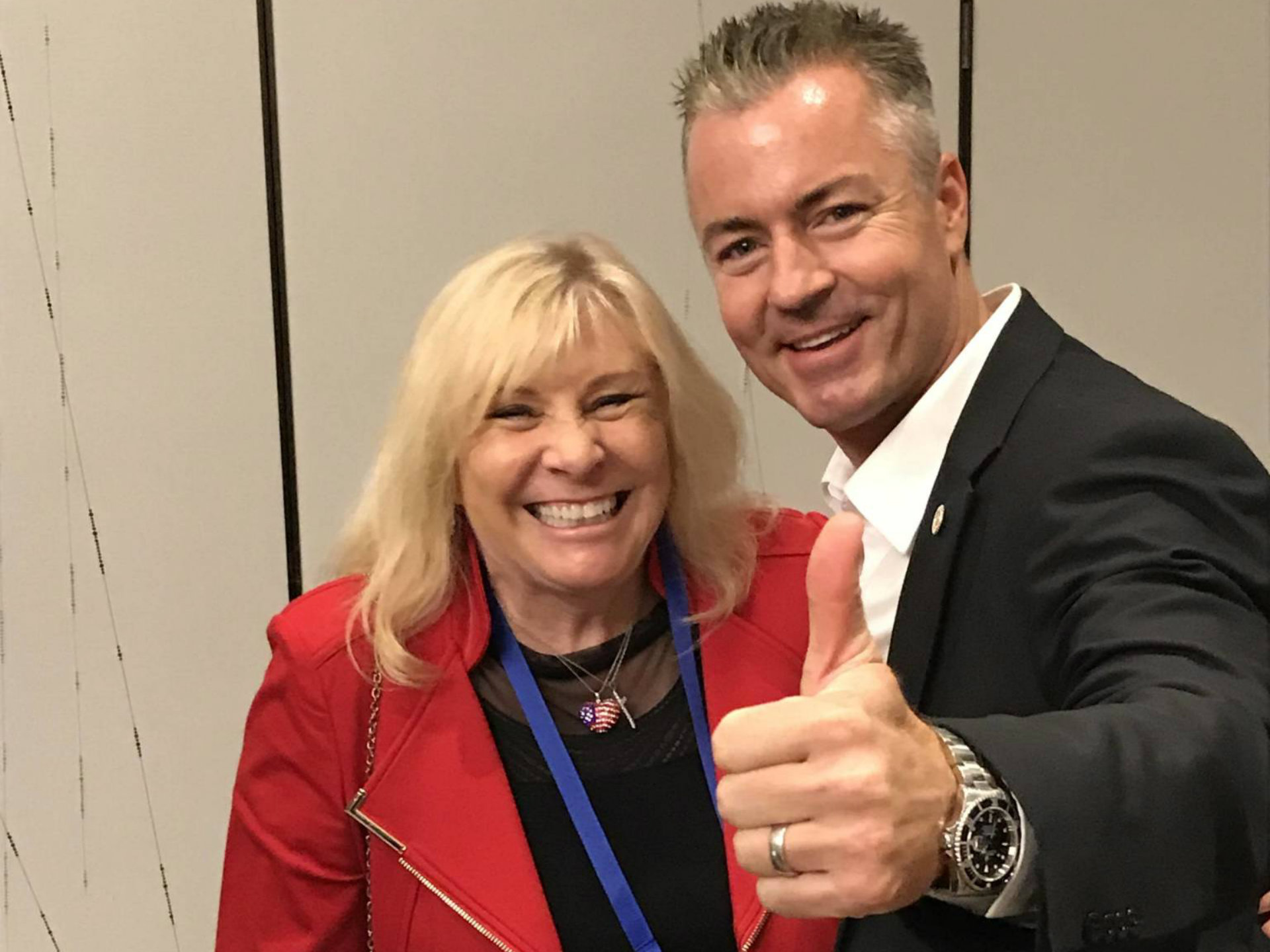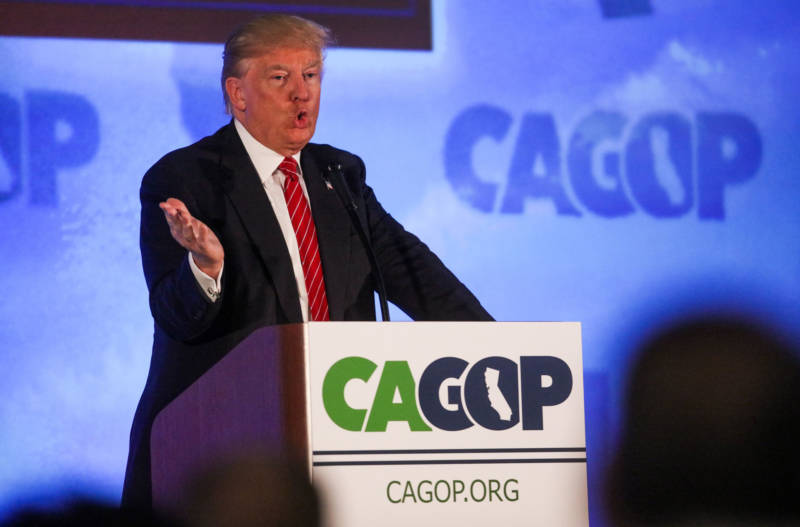What's left of the Republican Party in California is meeting in Sacramento this weekend to elect a new party chair, listen to speeches from former White House spokesman Sean Spicer and failed gubernatorial candidate John Cox — and party like it's 1994.
In 1994, Republicans held five of the eight statewide offices in California, including governor and a majority in the state Assembly. Also that year, Republicans backed Proposition 187, which was widely regarded as anti-immigrant. The measure passed, but the party has been sliding ever since.
Last year, a devastating November election cut the GOP's congressional delegation in half, delivered 75 percent of the state Legislature to Democrats and extended the party's shutout in statewide elections to 12 years.
Now, some Republicans — though certainly not all — feel it's time for a little soul-searching.
"I think the pulse of the GOP in California is very faint," said former Bay Area Assemblywoman Catharine Baker, a moderate who supports same-sex marriage, policies aimed at reducing carbon emissions that cause climate change and other "progressive" policies. "There's really no other message that Republicans can get from the November elections."
Despite her moderate positions, Baker lost her re-election bid in November to a Democrat — handing over the last remaining GOP seat in the Bay Area.
At a recent Commonwealth Club forum, Baker said voters told her "day in and day out" that "I like your positions, but I cannot vote for you because you have an 'R' after your name," adding that "to me it meant anything associated with the Republican Party was toxic in my district."
But some of the party faithful disagree, believing the state GOP needs to take a harder right turn — starting with the party's next leader.
Among the leading candidates to replace outgoing Chairman Jim Brulte is former Assemblyman Travis Allen of Huntington Beach, the fourth-place finisher in last year's June gubernatorial primary.

Allen is a favorite of the Republican Party's most conservative members, and he makes it clear he would not represent the kind of move to the middle many think the party needs to become more competitive in California.
"The concept that the Republican Party needs to somehow forgo its values to be more palatable in California is entirely incorrect," Allen said.
He blames the party's selection of relatively moderate gubernatorial candidates like Meg Whitman, Neel Kashkari and John Cox, calling that strategy "losing backwards" and arguing that the GOP should return to conservative Republicans like George Deukmejian, who was elected governor in 1982 and '86.
Of course that analysis ignores how much California has changed since then. In the past two decades, the Republican Party's share of the electorate in California has gone from 36 percent in 1998 to 24 percent today, third behind Democrats with 44 percent and "no party preference" or independent voters at 28 percent.
Allen is popular among the party faithful who attend GOP conventions, but other prominent Republicans have been making the case that the party needs to seriously reconsider its priorities.
"I believe the party in California is virtually dead," Kristin Olsen said at the Commonwealth Club panel.
Olsen, who led the Assembly Republicans when she represented the Modesto area in the state Legislature — and now serves on the Stanislaus County Board of Supervisors — believes that the party is "not salvageable" in its present state.
Olsen advocates for a third party to represent disaffected Republicans and others who feel the Democratic Party has drifted too far to the left. And when asked if she ever thinks about leaving the GOP, she said, "To be honest, I think about it weekly."
She does not, however, consider registering as a Democrat.
"I know I still believe in what at least were the fundamental principles of the conservative movement: limited government, balanced budgets, freedom and liberty, education excellence and economic opportunity," Olsen said.
But not everyone has given up on the GOP. Political consultant Matt Shupe, who was communications director for John Cox's unsuccessful gubernatorial campaign last year, describes himself as "an eternal optimist" and attributes the party's recent losses to "tactical and technical" problems, as opposed to being fundamentally out-of-sync with California voters on issues like immigration, LGBT rights and abortion.
However, he added, "We have just been the party of 'no' and we have fallen flat in coming up with alternative good, viable alternatives" to Democratic Party policies.
Shupe dismisses those who say the sky is falling for the California Republican Party. "I don't think there was a major pendulum swing," Shupe said of the November election.
He noted that in 2008, after Barack Obama was elected president, critics said the GOP was dead.
"A few years later Republicans took the House, and eight years later they had the House, the Senate and the presidency. This stuff comes in ebbs and flows," Shupe said.
Electoral reforms like California's top-two primary system have created the risk that GOP candidates are simply left off the ballot for statewide races, as they were in the U.S. Senate races in 2016 and 2018.
Last year, out of fear their voters would stay home, Republicans put a repeal of the gas tax increase on the November ballot, hoping that would help bring conservatives to the polls. The campaign for Proposition 6 was fueled with money from Cox, then-Republican House Majority Leader Kevin McCarthy and others.
But not only did voters reject Proposition 6, there's no evidence it helped mobilize conservatives.
Perhaps no election indicated how far Republicans have fallen than a relatively obscure race for the Board of Equalization in the San Diego area. The Republican candidate, state Sen. Joel Anderson, ran against a little-known Democrat, 80-year-old Michael Schaefer.

Although Anderson, a longtime state lawmaker, was far better known, he narrowly lost to Schaefer, who in the past had been convicted of misdemeanors, spent time in jail, was placed under a restraining order and lost his right to practice law in Nevada and California.
No matter — he had a "D" next to his name while Anderson had an "R." With that defeat, former Assemblywoman Baker said, "We might have hit rock bottom."
Republicans like Matt Shupe are hoping Travis Allen does not become the next party chair and instead favor political consultant Jessica Patterson, head of California Trailblazers. The organization helps recruit and train Republican candidates, and Patterson is considered a more mainstream candidate.
Whoever becomes GOP party chair this weekend will have the herculean task of figuring out a way to stop the party's long slide into near-irrelevance, while convincing voters to give Republicans serious consideration on the ballot. And, they'll need to do it with Donald Trump in the White House.
